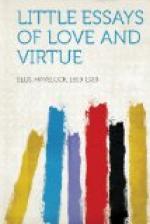Primitive eugenics had seldom anything to do with what we call “birth-control.” One must not say that it never had. Even the mysterious mika operation of so primitive a race as the Australians has been supposed to be a method of controlling conception. But the usual method, even of people highly advanced in culture, has been simpler. They preferred to see the new-born infant before deciding whether it was likely to prove a credit to its parents or to the human race generally, and if it seemed not up to the standard they dealt with it accordingly. At one time that was regarded as a cruel and even inhuman method. To-day, when the most civilised nations of the world have devoted all their best energies to competitive slaughter, we may have learnt to view the matter differently. If we can tolerate the wholesale murder and mutilation of the finest specimens of our race in the adult possession of all their aptitudes we cannot easily find anything to disapprove in the merciful disposal of the poorest specimens before they have even attained conscious possession of their senses. But in any case, and whatever we may ourselves be pleased to think or not to think, it is certain that some of the most highly developed peoples of the world have practised infanticide. It is equally certain that the practise has not proved destructive to the emotions of humanity and affection. Even some of the lowest human races,—as we commonly estimate them,—while finding it necessary to put aside a certain proportion of their new-born infants, expend a degree of love and even indulgence on the children they bring up which is rarely found among so-called civilised nations.
There is no need, however, to consider whether or not infanticide is humane. We are all agreed that it is altogether unnecessary, and that it is seldom that even that incipient form of infanticide called abortion, still so popular among us, need be resorted to. Our aim now—so far at all events as mere ideals go—is not to destroy life but to preserve it; we seek to improve the conditions of life and to render unnecessary the premature death of any human creature that has once drawn breath.




